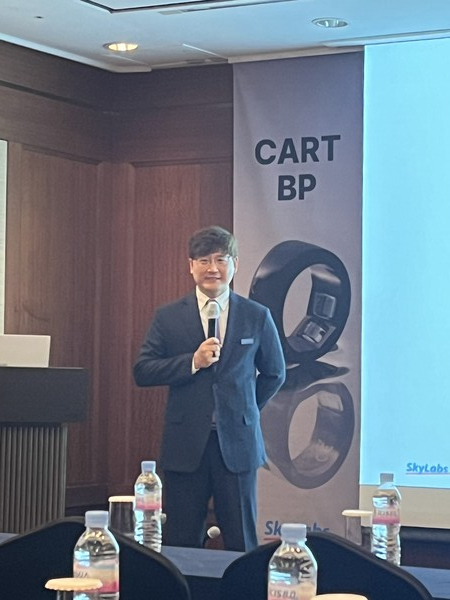During the quiet hours of the night, as most people wind down and relax, their blood pressure typically follows suit, naturally dipping in response to reduced activity. However, those experiencing chronic stress may have significant nocturnal drops in blood pressure.
Enter CART BP, a ring-type, cuffless continous blood pressure (BP) monitor that has earned distinction as not only the first smart ring to secure Ministry of Food and Drug Safety (MFDS) approval as a medical device in Korea, but also as a device now covered by health insurance, said Lee Byung-hwan, CEO of Sky Labs, during a press conference on Thursday. Sky Labs is the developer of CART BP.
With this coverage, hypertension patients' out-of-pocket costs are expected to be between 5,000 won ($3.61) and 6,000 won ($4.33).
“Hypertension, or high blood pressure, is not merely a daytime concern,” said Dr. Lee Hui-jin, a fellow of Seoul National University Hospital (SNUH)’s cardiology department, explaining the heightened risks of cardiovascular disease, heart attacks, and strokes associated with nighttime blood pressure spikes. “Nighttime blood pressure is a stronger predictor of future health complications.”

Recognizing the limitations of conventional 24-hour monitoring ambulatory blood pressure monitoring (ABPM), particularly the discomfort during sleep, the demand for a more user-friendly alternative has surged.
"There is a clear demand for a wearable blood pressure monitor that offers continuous, unobtrusive monitoring," said Lee.
Equipped with advanced biosensors like photoplethysmography (PPG), CART BP captures detailed blood flow data for AI-driven analysis and 24-hour monitoring. This continuing monitoring capability offers healthcare providers insights into blood pressure variations throughout the day, facilitating more precise treatment adjustments.
The innovation has garnered attention for a simple reason: the high prevalence of hypertensive patients.
In Korea, 12.3 million people grapple with hypertension, accounting for 28 percent of the adult population aged 20 and over, according to the Korean Society of Hypertension's 2023 Factsheet.
“Despite the widespread occurrence of hypertension, clinicians face significant challenges in diagnosing it based on one or two office blood pressure readings,” Dr. Lee of SNUH said, advocating for smarter monitoring solutions. “Blood pressure constantly fluctuates depending on environmental conditions, emotional state, and time of day.”
To address this variability, the concept of 24-hour ABPM has emerged. ABPM involves measuring blood pressure every 20 minutes during waking hours and every 30 minutes during sleep, which allows healthcare providers to understand the patterns of blood pressure fluctuations throughout the day and night.
Even then, ABPM faces challenges such as mobility constraints and sleep disturbances caused by cuff discomfort.
Sunny Pahk, Sky Labs' chief business officer, pointed out how their smart ring technology addresses these limitations. “CART BP provides accurate readings without disrupting daily activities or compromising sleep quality,” she said.
The smart ring learns from continuous measurements by combining PPG technology and deep learning algorithms, refining its predictive capabilities with each use.
"The potential impact of CART BP extends beyond individual health management," Pahk continued, highlighting its dual functionality as both a diagnostic tool in medical settings and a personal health companion for users.
She emphasized that Sky Lab's product is a certified medical device validated through clinical studies, positioning it ahead of consumer-oriented wellness devices like Samsung's Galaxy Ring. The latter emphasizes lifestyle tracking features but lacks medical certifications, raising concerns about accuracy and clinical utility, she said.
Since receiving MFDS approval in March last year, Sky Labs said on Thursday it obtained medical procedure fee approval from the Health Insurance Review and Assessment Service (HIRA) for prescriptions in healthcare facilities.
Sky Labs entered a domestic distribution agreement with Daewoong Pharmaceutical in June and initiated discussions with Omron, a Japanese electronics firm, regarding global distribution.
“Sky Lab’s immediate focus is on a successful domestic launch, but if I were to describe our dream,” Lee said. “It would be for patients visiting any hospital nationwide to consult with doctors, undergo blood pressure tests with CART BP, and then receive appropriate medical procedures anywhere in the country.”
Related articles
- Hanmi’s low-dose three-drug combo effective to treat mild/moderate hypertension
- ‘14% of Koreans have high blood pressure’
- SMC explores the future of surgical navigation with immersive XR technology
- How a culture of sleepless success in Korea impacts health and society
- Sky Labs unveils new all-in-one wearable device
- Sky Labs partners with Otsuka Pharmaceutical to expand global distribution of smart ring blood pressure monitor
- Sky Labs taps OMRON for Japan launch of smart ring blood pressure monitor
- Sky Labs celebrates 1st anniversary of ring-type BP monitor CART BP pro
- OMRON Healthcare Korea names Kazuhide Kondo as CEO

